Some of the items in this collection may be copyrighted by various entities.
Reuse of items on this site is allowed under fair use copyright laws;
(with credit to GayRodeoHistory.org).
Materials on this site are from a wide range of sources. We have no resources available to research copyright ownership; therefore we cannot guarantee free use of any given item. For commercial use, you are responsible for obtaining copyright permissions from the original owners.
This site began in July of 2011 as the personal project of Frank Harrell (AKA Cowboy Frank) with the cooperation of the IGRA Archives Committee. In September of 2016, Frank officially handed ownership of the website and all its scanned files over to the Gay and Lesbian Rodeo Heritage Foundation (GLRHF). Frank continues to host, develop and maintain the site but is no longer the official owner.
The physical materials of the archives remain the property of The International Gay Rodeo Association.
Due to the nature of its content, this site is extremely graphics intensive. Scanned items have been optimized for reasonable downloading and viewing, but each program currently requires multiple meg downloads.
For Internet access to the original high resolution files please contact the current chair at .
The History
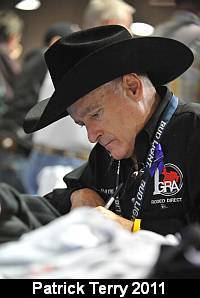
What has become the IGRA Archives, began in 1993 as a modest collection of rodeo programs, posters, flyers and documents, assembled by Patrick Terry, one of our most devoted, long-time IGRA members.
For many years the archives were kept in the IGRA office in the basement of Charlie's bar in Denver. We are thankful to Charlie's for the space they gave us so freely for so many years. Unfortunately, the basement is below ground level and had a tendency to flood from time to time. There was also a problem with mold and mildew.
As the use of computers and the Internet grew, and more and more IGRA business was performed via electronic methods, the need for a physical office diminished. Eventually the idea of having an office of any kind was abandoned and the IGRA day-to-day operations were moved to the homes or work places of the people who performed those duties. The IGRA Archives collection found itself isolated on the shelves of Charlie's basement, with no one to keep it company.
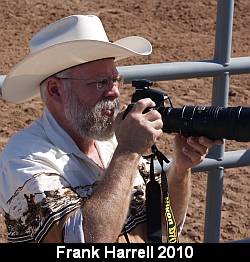
In June, 2010, after several floods had threatened and even damaged some of the archives, the decision was made to move the cardboard boxes containing the artifacts to a steel internodal container near the Jefferson County Fair Grounds in Golden, Colorado, where the Colorado Gay Rodeo Association (CGRA) keeps its records.
While less prone to flooding and mildew, the storage container also housed the rodeo equipment belonging to CGRA and tended to be very dirty and dusty. It was also subject to drastic temperature variations during the year. The inside could become 150 degrees in the summer and well below zero in the winter. Not the best environment to keep historical artifacts.

Jumping back a few years, in 2002, Frank Harrell, AKA Cowboy Frank, became the webmaster for the Atlantic States Gay Rodeo Association (ASGRA). One of the projects he envisioned and eventually carried out, was to place complete scanned copies of all the past ASGRA rodeo programs on the association's website. A feat he finally accomplished after several years of begging and pleading for copies of old programs.
In 2005, Frank became the webmaster for IGRA, a job he still holds (as of this writing) except for a 4 year hiatus between 2011 and 2015. He had a vision to do the same kind of presentation with all past gay rodeo programs, but, because he lived in Virginia, extended access to the archives in Denver, which would have been neccessary for such a project, was not practical.
In 2009, Gregory Hinton became interested in a recent Ebay auction where the famous shirts from the film "Brokeback Mountain" had been purchased by a collector. Gregory worked with the collector and arranged for the long-term loan of the shirts to the Autry National Center in Los Angles.
Gregory also placed a call to then IGRA president Brian Helander and upon learning that there was an actual archives of gay rodeo artifacts, worked, at the request of President Helander, to formulate an agreement between the Autry and IGRA. Gregory and Patrick went to work to have much of the existing archives donated to the Autry for permanent storage, in a proper environment, and available to historical researchers. The transfer of about half of the archives to the Autry occurred on July 22, 2009.
In July, 2010, Frank Harrell and his life partner Tom, made a sudden and unexpected decision to move from Virginia to Colorado, a place where Frank had longed to live since the late 1960's. In November, they purchased a home in Castle Rock, just south of Denver.
Near the beginning of 2011, with Patrick Terry's approval, Brian Rogers took over the position of IGRA Archives Chairman. A search was begun to find a better storage location for the remainder of the archives.
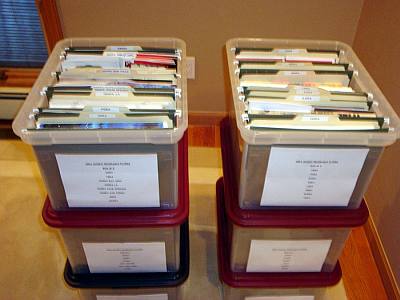
Upon hearing about Frank and Tom's new home and its huge cellar, Brian asked them if they could store at least part of the archives. The nature of the way the cellar is built, presents, while not perfect, a much better environment for archive storage than the storage container near the fairgrounds because the temperature and humidity are very stable. Being in a semi-desert area, there is little chance of mildew and it is almost impossible to flood. The house also has a commercial burglar and fire alarm system. Not knowing exactly what or how much the archives consisted of, they were a bit hesitant. However, Brian persisted and eventually they agreed to store the collection, at least for a short time.
After the Denver rodeo in July, 2011, Brian and Patrick moved the collection to Frank and Tom's dining room. Brian, Frank and Tom spent 3 days sorting and reorganizing the collection of programs and brochures before placing the collection in the cellar. Frank was overjoyed, finding the very collection he had wanted to work with for so long right in his own home.
Organization
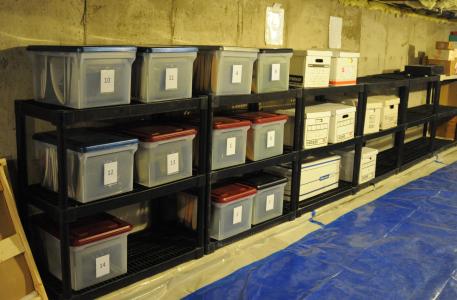
Originally everything was sorted chronologically. However this arrangement turned out to be difficult to work with. If one wanted to find all the programs from say, Palm Springs, they were scattered across the collection and it was impossible to determine which programs might be missing versus what year's they might not have had a rodeo.
The initial sort in Frank and Tom's dining room rearranged everything according to association acronym. Later Frank discovered a problem with this arrangement in that some associations changed their names and acronyms from time to time and, in a few cases, different associations ended up with the same acronym for a period. There was also a problem where the same rodeo found itself being hosted by different associations, in different locations, but using the same rodeo name.
So over several weeks, Tom and Frank reorganized the collection of programs yet again, placing items by state then by the nearest major city where the rodeos were held. Texas was the exception because their rodeos moved around from city to city, so all the Texas rodeos are organized chronologically, rather than by city.
Then, Frank went to work scanning programs and developing this website. He registered the domain, GayRodeoHistory.org, and on July 26, 2011, the first pages were posted. During the next 8 months, Frank scanned away and on March 21, 2012, at 12:40 in the afternoon, after almost 13,000 scanned pages, the last of the 379 programs and 16 of the magazines in the archives at that point were posted. The word then started going out again for folks to check their collections for missing programs.
Over the next few years, the donated materials in the archives quadrupled and continues to expand as more people step up and donate items from their closets, garages and attics.
In August, 2016, Frank officially handed the ownership of the digital version of this site to the Gay and Lesbian Rodeo Heritage Foundation (GLRHF). The physical archives currently remain the property of IGRA.
On January 18, 2018, Frank woke up to discover his life partner and husband Tom had passed away during the night.
Over the following months, Frank handed the physical archives over to Roger Bergmann. The artifacts were collected and moved to a storage facility in Las Vegas where Roger lives.
In July of 2019, more of the archives was donated to "One Archives" in California.
Donations, loans
or access to high resolution versions
We are seeking items for the archives
- Missing programs (check the programs date grid page for a list)
- Association and rodeo pins
- Buckles
- Posters
- Contestant/officials badges
If you really want to keep an item, we will be happy to return items after scanning or photographing. Just make sure you include a paper stating what items you want back.
We will add your name as the donator, and if the item was collected by a deceased partner or friend we will be happy to include a short paragraph about the person.
To donate or loan an item, please contact the current archives chair, Roger Bergmann, at the email address below. Please email first to make sure someone will be available to receive your donation.
Please contact .
For open Internet access to the original high resolution files please contact the current chair at the above address.
The Physical Inventory
About half of the Archives were donated to the Autry Museum in Los Angles, California on July 22, 2009. Between July 2011 and January 2018, the remainder of the Archives were housed in the cellar of Frank Harrell in Castle Rock, Colorado.
In January 2018, Frank's partner and husband unexpectedly passed away. Frank decided to sell the house so there was a rush by the committee to find another home for the archives. As of February, 2018, the archives were moved to a storage facility in Las Vegas, Nevada under the management of Roger Bergmann, the new Archives Chair.
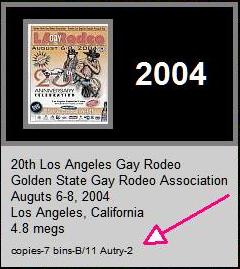
Programs are now stored in plastic bins with a single master copy of each rodeo program in individual manilla folders, then rodeo cities are grouped in hanging folders within one set of bins. To help prevent the possibility of loosing an entire bunch from water or rodent damage, an extra copy, if available, is stored in a separate set of bins.
If you look at the grid on the programs index page, each popup window has a line of small print at the bottom indicating the total number of copies and which bins they are in.
In the example at the left, IGRA has 7 copies in the archives. One master copy is in bin B, while the remaining 6 backup copies are in bin 11. The Aurty Center in Los Angles has 2 copies.
In the future we will try to collect 3 copies of each rodeo program. One as a master copy, one for backup, and one to be donated to an archival museum.
The Electronic Versions
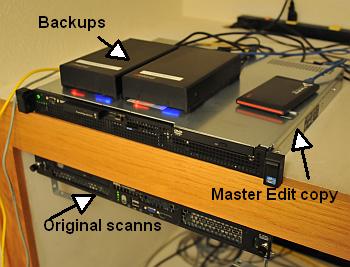
The original high resolution scans and photographs of all items on this website are on a server located in Frank Harrell's home in Castle Rock, Colorado. These can be made available via an FTP account or by a non-published website address to those who need access to the master files.
The master editing copy of this website is on another server in Frank's home. This server also contains the master editing copies of all Frank's currently active websites. If Frank is traveling in his travel trailer, the master server is transferred to his trailer for the trip.
Both the original scan files and the website are backed up weekly onto external hard drives connected to each server.
There are also 3 backup copies of all files and the website on 500 gig portable drives which are updated periodically and held by the following people.
- Patrick Terry, Denver area, Colorado
- Brian Rogers, Santa Rosa, California
- Roger Bergmann, Las Vegas, Nevada
These people are very much involved in IGRA affairs so they should be easily reachable in the event one of the backups is needed.
The actual website is hosted with a company called ProHosting in Provo, Utah. The site currently resides on an account called asgra.org, which is owned by Frank and also serves a number of his other sites.
In the event of both Frank and his partner Tom's unexpected deaths, there exists a document containing access codes and passwords for both the web hosting and the domain Registrar accounts associated with this site. This document is held by 5 trusted people around the country. The persons listed above have a document containing the names and contact information of the folks holding the master accounts and passwords.
Frank Harrell,
Webmaster, IGRA